高中英语必修一第四单元重点难点
【7A文】高中英语必修一第四单元重点难点

UnitfourEarthquakes1、Inthecity,thewaterpipesinsomebuildingscrachedandburst.城市里,一些大楼里的水管爆裂。
burst爆裂,突发用法归纳:Thesquareisburstingwithtourists.广场上到处都是游客。
Ifeltasifmyheartwouldburstwithjoy.我觉得自己高兴得心花怒放。
Thepoliceburstthroughthedoor.警察破门而入。
Therewasaburstoflaughterinthenextroom.隔壁房间里突然爆发出一阵笑声。
联想扩展:(1)burstinon…突然打断Heburstinonourconversation.他突然打断了我们的谈话。
(2)burstinto+n.突然…Thespeakerburstintoangryspeech.演讲者突然讲粗话。
(3)burstout+doing突然…Thewomanburstoutcryinglikeachild.那个妇女突然像小孩一样哭了。
(4)bursttodosth.迫切想做某事Iamburstingtotellyouthenews.我迫不及待的想告诉你这个消息。
2、Buttheonemillionpeopleofthecity,whothoughtlittleoftheseevents,wereasleepasusualthatnight. 但是认为这没什么的一百万城里人,那天晚上还像往常一样睡觉。
易混辨析:affair,event,accident,incident,matter和business事;事情affair指要做的事或已经发生的事。
多用复数。
event指重大历史事件,也可指日常生活中较重要的事或比赛项目。
accident指意外或偶然的不幸事件,多有不良后果。
incident与重要事件有关的事情,尤指政治、军事上有争议的情况。
2019人教版高中英语必修一Unit 4 单元重难点

1.suffer a disaster 遭受灾难2.slide down the grassy slope从草坡上滑了下来3.rescue the drowning man营救溺水的男子4.volcanic eruption 火山喷发5.cause serious damage to the country's economy对国家的经济造成严重破坏6.destroy the environment破坏环境7.spare no effort 不遗余力8.a rough shelter from old pieces of wood用旧木条搭的简陋的窝棚9.walk into trap 走入陷阱10.be buried in a book埋头读书11.a woman of great wisdom 才女12.context dependent上下文相关13.suffer huge losses遭受巨额亏损14.water supply 水供应15.tap me on the shoulder拍我的肩膀16.in case of (an) emergency 紧急情况下17.keep calm 保持镇静18.wave goodbye to me挥手向我告别19.strike his head on the edge of the table 他的头碰在桌棱上20.cause and effect 因果关系Ⅰ.变形词汇1.dry adj. 干的;口渴的v.变干,弄干→ drought n.旱灾;久旱2. die vi. 去世;死亡→ dead adj.无生命的;呆板的→ death n.死;死亡3.deliver vt.& vi.递送;传达vt.发表→ delivery n.交付;分娩;递送4.suffer vt.遭受;蒙受vi.(因疾病、痛苦、悲伤等)受苦→ suffering n.折磨;苦难;pl.痛苦5.survive vi.存活;生存vt.幸存;艰难度过→ survival n.幸存→ survivor n.幸存者6.effect n.结果;效果;影响→ effective adj.有效的;有影响的→ affect vt.影响7.breathless adj.气喘吁吁的;屏息的→ breathe v.呼吸→ breath n.呼吸8.length n.长度;长→ lengthen v.加长→ long adj.长的Ⅰ.阅读词汇检测时遮住右侧的汉语,在□中标记不会的词汇1.□tornado n.龙卷风;旋风2.□landslide n.(landfall)(山地或悬崖的)崩塌;滑坡3.□tsunami n.海啸4.□magnitude n.(地)震级;重大5.□evacuate vt.疏散;撤出vi.撤离6.□helicopter n.直升机7.□crack n.裂纹;裂缝vi.& vt.(使)破裂8.□percent n.百分之…… adj.& adv.每一百中9.□brick n.砖;砖块10.□metal n.金属11.□electricity n.电;电能12.□revive vt.& vi.复活;(使)苏醒13.□revival n.振兴;复苏14.□volcano n.火山15.□erupt vi.& vt.(火山)爆发;(岩浆、烟等)喷出16.□typhoon n.台风17.□hurricane n.(尤指西大西洋的)飓风18.□power n.电力供应;能量;力量;控制力19.□pipe n.管子;管道20.□whistle vi.吹口哨;发出笛声vt.吹口哨n.哨子(声);呼啸声21.□aid n.援助;帮助;救援物资vi.& vt.(formal)帮助;援助22.□kit n.成套工具;成套设备Ⅰ.拓展词汇1.自然灾害Ⅰfamine 饥荒Ⅰmudslide 泥石流Ⅰsandstorm 沙尘暴Ⅰearthquake 地震Ⅰwildfire 森林大火Ⅰsnowstorm 暴风雪Ⅰavalanche 雪崩Ⅰhail 冰雹2.“ed/ing”形容词集锦Ⅰamazing 令人惊奇的amazed 吃惊的,惊奇的Ⅰdisappointing 令人失望的disappointed 感到失望的Ⅰfrightening 令人恐惧的frightened 受惊的Ⅰshocking 令人震惊的shocked 感到震惊的Ⅰsurprising 令人吃惊的surprised 感到吃惊的Ⅰterrifying 令人害怕的terrified 感到害怕的Ⅰ.重点短语1.behave as_if nothing has happened表现得若无其事2.leave the area in_ruins 使这个地区满目疮痍3.look at me in_shock 吃惊地看着我4.in_summary 总的来说5.first_aid kit急救箱6.work out in_the_open_air 露天锻炼7.have no cash on_hand 手头没有现金8.sweep swimmers away without warning毫无预兆地把游泳者冲走Ⅰ.课文佳句1.Chickens and even pigs were_too_nervous_to_eat,and dogs refused to go inside buildings.(too+adj.+to...太……而不能……)鸡甚至猪都紧张得吃不下东西,狗也不愿意进圈舍里去。
高一英语必修一第四单元主要知识难点2023
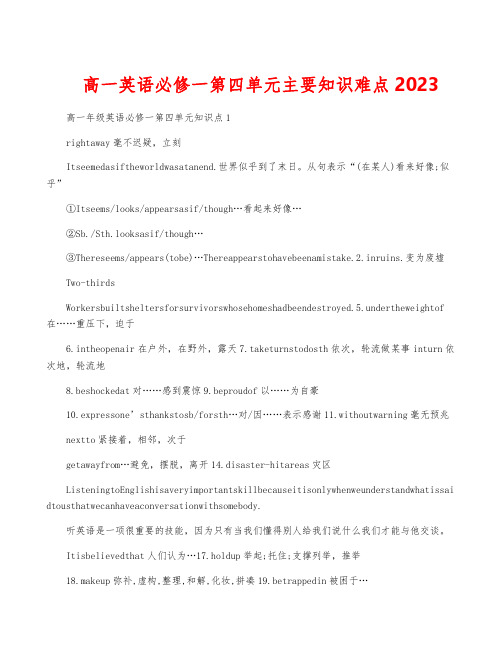
高一英语必修一第四单元主要知识难点2023高一年级英语必修一第四单元知识点1rightaway毫不迟疑,立刻Itseemedasiftheworldwasatanend.世界似乎到了末日。
从句表示“(在某人)看来好像;似乎”①Itseems/looks/appearsasif/though…看起来好像…②Sb./Sth.looksasif/though…③Thereseems/appears(tobe)…Thereappearstohavebeenamistake.2.inruins.变为废墟Two-thirdsWorkersbuiltsheltersforsurvivorswhosehomeshadbeendestroyed.5.undertheweightof 在……重压下,迫于6.intheopenair在户外,在野外,露天7.taketurnstodosth依次,轮流做某事inturn依次地,轮流地8.beshockedat对……感到震惊9.beproudof以……为自豪10.expressone’sthankstosb/forsth…对/因……表示感谢11.withoutwarning毫无预兆nextto紧接着,相邻,次于getawayfrom…避免,摆脱,离开14.disaster-hitareas灾区ListeningtoEnglishisaveryimportantskillbecauseitisonlywhenweunderstandwhatissai dtousthatwecanhaveaconversationwithsomebody.听英语是一项很重要的技能,因为只有当我们懂得别人给我们说什么我们才能与他交谈。
Itisbelievedthat人们认为…17.holdup举起;托住;支撑列举,推举18.makeup弥补,虚构,整理,和解,化妆,拼凑19.betrappedin被困于…Itissaidthat…据说...befixedto…被固定到……22.betiedto…被绑在……高一年级英语必修一第四单元知识点2devotes…todoing奉于fightagainst对抗,反对,与……作斗争3.selflessly无私地befreefrom免于,不受beinprison入狱,在狱中服刑6.thefirstmantodo第一个…的人ThetimewhenIfirstmethimwasaverydifficultperiodofmylife.第一次见到他的时候是在我一生中非常艰难的时期。
高一英语必修一unit4知识点
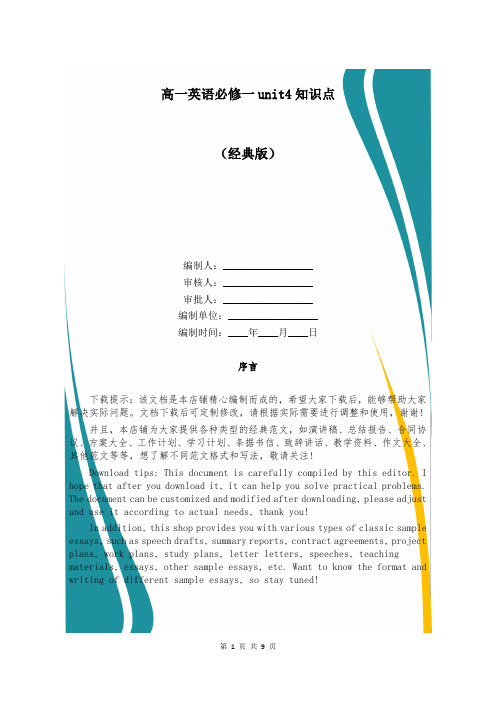
高一英语必修一unit4知识点(经典版)编制人:__________________审核人:__________________审批人:__________________编制单位:__________________编制时间:____年____月____日序言下载提示:该文档是本店铺精心编制而成的,希望大家下载后,能够帮助大家解决实际问题。
文档下载后可定制修改,请根据实际需要进行调整和使用,谢谢!并且,本店铺为大家提供各种类型的经典范文,如演讲稿、总结报告、合同协议、方案大全、工作计划、学习计划、条据书信、致辞讲话、教学资料、作文大全、其他范文等等,想了解不同范文格式和写法,敬请关注!Download tips: This document is carefully compiled by this editor. I hope that after you download it, it can help you solve practical problems. The document can be customized and modified after downloading, please adjust and use it according to actual needs, thank you!In addition, this shop provides you with various types of classic sample essays, such as speech drafts, summary reports, contract agreements, project plans, work plans, study plans, letter letters, speeches, teaching materials, essays, other sample essays, etc. Want to know the format and writing of different sample essays, so stay tuned!高一英语必修一unit4知识点知识能够被获得,并且因为它的本质,知识总是局部的,它永远都不是完整的,所以,一切源于知识的行动也都是局部的、不完整的。
高中英语必修一第四单元重点、难点
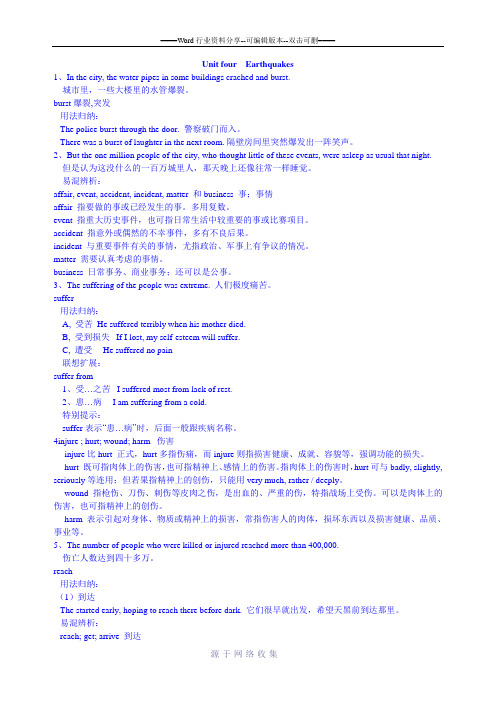
Unit four Earthquakes1、In the city, the water pipes in some buildings crached and burst.城市里,一些大楼里的水管爆裂。
burst爆裂,突发用法归纳:The police burst through the door. 警察破门而入。
There was a burst of laughter in the next room. 隔壁房间里突然爆发出一阵笑声。
2、But the one million people of the city, who thought little of these events, were asleep as usual that night.但是认为这没什么的一百万城里人,那天晚上还像往常一样睡觉。
易混辨析:affair, event, accident, incident, matter 和business 事;事情affair 指要做的事或已经发生的事。
多用复数。
event 指重大历史事件,也可指日常生活中较重要的事或比赛项目。
accident 指意外或偶然的不幸事件,多有不良后果。
incident 与重要事件有关的事情,尤指政治、军事上有争议的情况。
matter 需要认真考虑的事情。
business 日常事务、商业事务;还可以是公事。
3、The suffering of the people was extreme. 人们极度痛苦。
suffer用法归纳:A, 受苦He suffered terribly when his mother died.B, 受到损失If I lost, my self-esteem will suffer.C, 遭受 He suffered no pain联想扩展:suffer from1、受…之苦I suffered most from lack of rest.2、患…病I am suffering from a cold.特别提示:suffer表示“患…病”时,后面一般跟疾病名称。
必修一Unit 4知识点总结
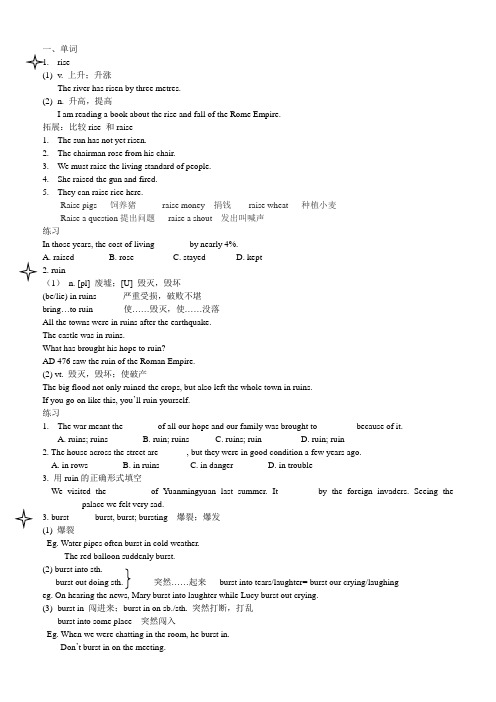
rise(1)v. 上升;升涨The river has risen by three metres.(2)n. 升高,提高I am reading a book about the rise and fall of the Rome Empire.拓展:比较rise 和raise1.The sun has not yet risen.2.The chairman rose from his chair.3.We must raise the living standard of people.4.She raised the gun and fired.5.They can raise rice here.Raise pigs 饲养猪raise money 捐钱raise wheat 种植小麦Raise a question提出问题raise a shout 发出叫喊声练习In those years, the cost of living _______ by nearly 4%.A. raisedB. roseC. stayedD. kept2. ruin(1)n. [pl] 废墟;[U] 毁灭,毁坏(be/lie) in ruins 严重受损,破败不堪bring…to ruin 使……毁灭,使……没落All the towns were in ruins after the earthquake.The castle was in ruins.What has brought his hope to ruin?AD 476 saw the ruin of the Roman Empire.(2) vt. 毁灭,毁坏;使破产The big flood not only ruined the crops, but also left the whole town in ruins.If you go on like this, you’ll ruin yourself.练习1.The war meant the _______ of all our hope and our family was brought to ________ because of it.A. ruins; ruinsB. ruin; ruinsC. ruins; ruinD. ruin; ruin2. The house across the street are ______, but they were in good condition a few years ago.A. in rowsB. in ruinsC. in dangerD. in trouble3. 用ruin的正确形式填空We visited the ________ of Yuanmingyuan last summer. It _______ by the foreign invaders. Seeing the _________palace we felt very sad.3. burst burst, burst; bursting 爆裂;爆发(1) 爆裂Eg. Water pipes often burst in cold weather.The red balloon suddenly burst.(2) burst into sth.burst out doing sth. 突然……起来burst into tears/laughter= burst our crying/laughingeg. On hearing the news, Mary burst into laughter while Lucy burst out crying.(3)burst in 闯进来;burst in on sb./sth. 突然打断,打乱burst into some place 突然闯入Eg. When we were chatting in the room, he burst in.Don’t burst in on the meeting.爆裂突然大哭闯入练习1. Every time _________he thought of his past, he couldn’t help bursting ________.A. when; out tearsB. that; into cryingC. which; into tearsD. /; out crying2. On seeing Jay Chou appear on the stage, the audience _______ cheering.A. burst onB. burst intoC. burst inD. burst out3. Yesterday evening I was watching TV at home when the front door ________________(突然开了)。
高一英语必修一unit4知识点总结四

高一英语必修一unit4知识点总结四高中英语必修四unit4知识点2It 作形式宾语用来替代作宾语的`从句、动词不定式、动名词,而把真正作宾语的从句、动词不定式、动名词置于句尾。
It 作形式宾语的常见句型:1. verb+ it+ adj./noun (for/of) to do/clause (verb=think, believe,suppose, consider, feel, make, keep…)例 I think it hard for you to do the task on your own./I think it hard that you'll do the task on your own.2. verb+it+adj./noun (one's) doing(adj.=useless/worth/worthwhile)(noun=no use/no good/worth one's while/a wasteof time/money/energy/words) (verb=think, believe, suppose, consider, feel,make, keep…)例 I'll make it worth your while telling me about his secret.3.verb+it+important/unimportant/necessary/unnecessary/ natural/essential that … (should)…verb+it+ofmuch/great/no/little importancetha t…(should)…(verb=think, believe, suppose, consider, feel, make, keep…)例 I think it important that you (should) attendthe conference.4. verb + it+ as+ noun/adj.+ clause (verb=accept, regard, take, see,view)例 The lecturer takes it as encouraging when so many students attendhis lecture.5. v. +it + prep. + that…owe it to sb. that…把…归功于…leave it to sb that…把…留给某人去做take it for granted that …想当然keep it in mind that…例 Don't bother to arrange anything. Just leave it to me to sort out.6. It用在不能直接跟宾语从句的动词后面,尤其是表示好恶的动词后,enjoy,like, love, dislike, resent, hate, don't mind, be fond of, feel like, see to 宾语从句紧跟it之后例 I hate it you can swim so well and I can't.7. It用在不能直接跟宾语从句的介词后面,宾语从句紧跟it之后(except that例外)例 I'm for it that you will follow their advice.高一英语必修一unit4知识点总结 (菁选2篇)(扩展4)——英语高一必修1知识点总结5篇英语高一必修1知识点总结1重点单词major local represent curious introduceapproach stranger express action generalavoid misunderstand similar agreement *punish intend means universal culturalapologize behave bow flight defencedormitory canteen dash fortable distanceprefer touch custom false hugfunction international powerful greet fistyawn threaten respectful association gesture英语高一必修1知识点总结2重点句子1. Whichever and whatever you like, there is a theme park for you!2. With all these attractions, no wonder tourism is increasing wherever there is a Disneyland.3. To enter a world of fantasy about ancient England, e to Camelot Park!4. Futuroscope is not only for inpiduals, but is also the perfect mix of fun and learning for class outings.5. If driving, Futuroscope is within easy reach of the freeway.6. Visit the candy shop to try the same kind of candy that American southerners made 150years ago, or take a ride on the only steam engine train still working in the …7. After that, joined some drivers and went to the bottom of the ocean to see the strange blind creatures that have never seen sunlight.Visitors can get close to parts of the world they have never experienced, going to the bottom of the ocean, flying through the jungle or visiting the edges of the solar system。
高中英语必修一UNIT4知识点归纳及练习(附答案

6.But the one million people of the city, who thought little of these events, were asleep as usual that
night.
可是, 个城市的一百万居民都没有把 些状况当一回事,当日夜晚照旧睡着了。
9.__________ have known the results of the exam.
A. It seemed to B. It seemed to him to C. He seemed that he D. He seemed to
人 地球表面是一些板 。
27.hold up起;托住;支撑;使阻滞;耽 ;提出;阻 ;列 ,推 ;(理 等)得住
Women can hold up half of the sky.女能 半 天。
28.make up弥,虚假,制,整理,包装,和解,,化,足,拼集
Farm workers make up only a small section of the population.
民只占人口的一小部分.
The boy made up a story; it was not true男.孩 了个故事, 故事不是真的。
29.The judge gave a prize and his congratulations to the cyclist who won the competition裁.判把 金 得比 的自行 手,并向他祝 。
二、
(一)
1. The rich_____ not always happy.
A. isB. areC. hasD. have
人教高中英语必修一 Unit 4课本知识点复习
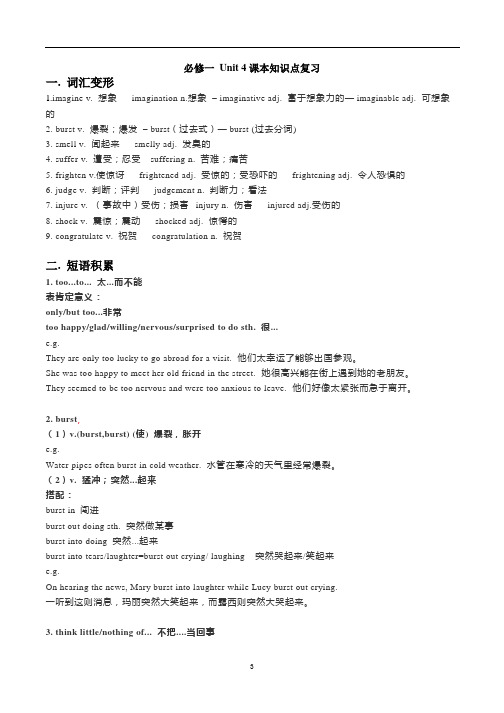
必修一Unit 4课本知识点复习一. 词汇变形1.imagine v. 想象-- imagination n.想象– imaginative adj. 富于想象力的— imaginable adj. 可想象的2. burst v. 爆裂;爆发– burst(过去式)— burst (过去分词)3. smell v. 闻起来-- smelly adj. 发臭的4. suffer v. 遭受;忍受-- suffering n. 苦难;痛苦5. frighten v.使惊讶-- frightened adj. 受惊的;受恐吓的-- frightening adj. 令人恐惧的6. judge v. 判断;评判-- judgement n. 判断力;看法7. injure v. (事故中)受伤;损害--injury n. 伤害-- injured adj.受伤的8. shock v. 震惊;震动-- shocked adj. 惊愕的9. congratulate v. 祝贺-- congratulation n. 祝贺二. 短语积累1. too...to... 太...而不能表肯定意义:only/but too...非常too happy/glad/willing/nervous/surprised to do sth. 很...e.g.They are only too lucky to go abroad for a visit. 他们太幸运了能够出国参观。
She was too happy to meet her old friend in the street. 她很高兴能在街上遇到她的老朋友。
They seemed to be too nervous and were too anxious to leave. 他们好像太紧张而急于离开。
2. burst(1)v.(burst,burst) (使) 爆裂,胀开e.g.Water pipes often burst in cold weather. 水管在寒冷的天气里经常爆裂。
人教版高一英语必修一Unit-4-知识点整理

Unit 4 Earthquakes课本知识点复习1、Describe to your partner what might happen to the objects in the photos(1)表示"某人出了某事(常指不好的事)",要用"sth.+ happen+to sb."这一结构来表达。
例如:A car accident happened to her this morning. 今天上午她发生了交通事故。
What happened to you? 你怎么啦?(2). 表示"某人碰巧做某事",要用"sb.+ happen+ to do sth."这一结构来表达。
例如:I happened to meet a friend of mine in the street yesterday. 昨天我碰巧在街上遇到了我的一个朋友(3). happen表示"碰巧或恰巧发生某事"时,还可用"It happens / happened that..."这一结构来表达。
例如:It happened that Brian and Peter were at home that day. 碰巧那天布莱恩和彼得在家了。
It happened that he had to take part in a meeting that afternoon. 碰巧那天下午他不得不参加一个会议。
(4)表示"某地(某时)发生了什么事",常用"sth.+ happen +地点/时间"这一结构来表达,此时主语应是事情。
例如:The story happened in 2003. 这个故事发生在2003年。
Stranger things were happening in the countryside of northeast Hebei. (课文句子)2.right away = at once 立刻,马上3. crack 意为“破裂,裂开,打,击,撞”crack down (on)对···采取严厉的措施Police crack down on drug dealers. 警察对贩毒分子严惩不贷。
高一英语必修一unit4知识点总结
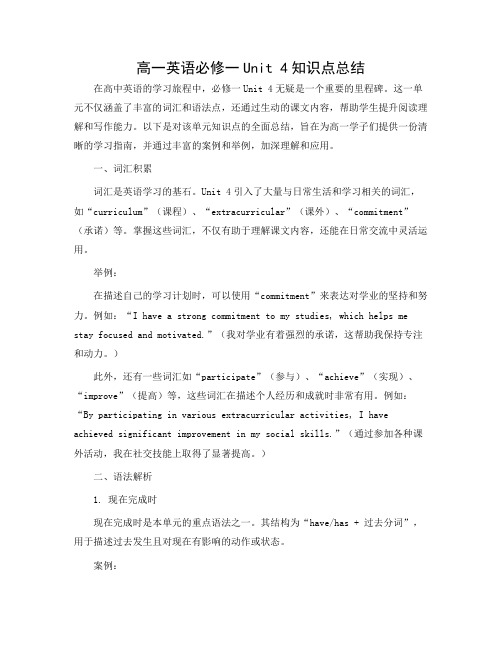
高一英语必修一Unit 4知识点总结在高中英语的学习旅程中,必修一Unit 4无疑是一个重要的里程碑。
这一单元不仅涵盖了丰富的词汇和语法点,还通过生动的课文内容,帮助学生提升阅读理解和写作能力。
以下是对该单元知识点的全面总结,旨在为高一学子们提供一份清晰的学习指南,并通过丰富的案例和举例,加深理解和应用。
一、词汇积累词汇是英语学习的基石。
Unit 4引入了大量与日常生活和学习相关的词汇,如“curriculum”(课程)、“extracurricular”(课外)、“commitment”(承诺)等。
掌握这些词汇,不仅有助于理解课文内容,还能在日常交流中灵活运用。
举例:在描述自己的学习计划时,可以使用“commitment”来表达对学业的坚持和努力。
例如:“I have a strong commitment to my studies, which helps me stay focused and motivated.”(我对学业有着强烈的承诺,这帮助我保持专注和动力。
)此外,还有一些词汇如“participate”(参与)、“achieve”(实现)、“improve”(提高)等,这些词汇在描述个人经历和成就时非常有用。
例如:“By participating in various extracurricular activities, I have achieved significant improvement in my social skills.”(通过参加各种课外活动,我在社交技能上取得了显著提高。
)二、语法解析1. 现在完成时现在完成时是本单元的重点语法之一。
其结构为“have/has + 过去分词”,用于描述过去发生且对现在有影响的动作或状态。
案例:小李在英语课上被问到:“Have you finished your homework?”(你完成作业了吗?)小李回答:“Yes, I have finished it.”(是的,我已经完成了。
人教版高一英语必修一unit4知识点讲解

人教版高一英语必修一unit4知识点讲解Unit 4 Knowledge Points ExplanationUnit 4 of the People's Education Edition for Grade 11 English textbook covers various knowledge points related to the theme of "Earthquakes". In this unit, students will acquire a deeper understanding of earthquake-related vocabulary, grammar structures, and reading skills. Without further ado, let us delve into the essential concepts covered in this unit.I. Vocabulary1. Earthquake-related vocabulary: In this section, students will learn key earthquake vocabulary such as tremor, magnitude, epicenter, seismograph, and aftershock. It is crucial to have a firm grasp of these terms to effectively communicate and understand information about earthquakes.2. Synonyms and antonyms: This module aims at enhancing students' lexical range by exploring synonyms and antonyms of common words. By learning synonyms and antonyms, students canimprove their ability to express ideas in a more nuanced and precise manner.II. Grammar1. Passive voice: Unit 4 focuses on the use of passive voice. By understanding and practicing the construction of passive sentences, students can accurately convey earthquake-related information, such as "The city was devastated by the earthquake."2. Attributive clauses: This section introduces attributive clauses, or relative clauses, which provide additional information about a noun. Students will learn how to use relative pronouns (who, which, that) to modify nouns in their writing and speaking.III. Reading Skills1. Skimming and scanning: Skimming and scanning are two essential reading skills that help students quickly locate relevant information in a text. Students will learn how to skim and scan passages about earthquakes to extract key details and main ideas efficiently.2. Understanding text structure: This module focuses on recognizing different text structures, such as cause and effect, compare and contrast, and problem and solution. By familiarizing themselves with these structures, students can better understand the organization of a text and extract relevant information more effectively.IV. Writing Skills1. Descriptive writing: In this part, students will develop their descriptive writing skills by describing earthquakes and their impact. They will learn how to use vivid language and sensory details to create a more engaging and informative description.2. Paragraph organization: This module emphasizes the importance of coherent paragraph organization. Students will learn how to structure paragraphs logically, ensuring a smooth flow of ideas and providing clear topic sentences and supporting details.V. Listening and Speaking Skills1. Note-taking in lectures: This section focuses on effective note-taking skills during lectures. Students will practice listening to earthquake-related information and summarize the key points in their own words.2. Group discussions: Students will participate in group discussions on various topics related to earthquakes. This activity aims to improve their ability to express opinions, engage in meaningful conversations, and collaborate with peers.In conclusion, Unit 4 of the People's Education Edition for Grade 11 English provides comprehensive knowledge points that enable students to expand their vocabulary, enhance grammar skills, improve reading comprehension, develop writing proficiency, and strengthen listening and speaking abilities. By mastering these knowledge points, students will be better equipped to comprehend and discuss earthquake-related topics, both academically and in real-life situations.。
高一必修一unit4知识点
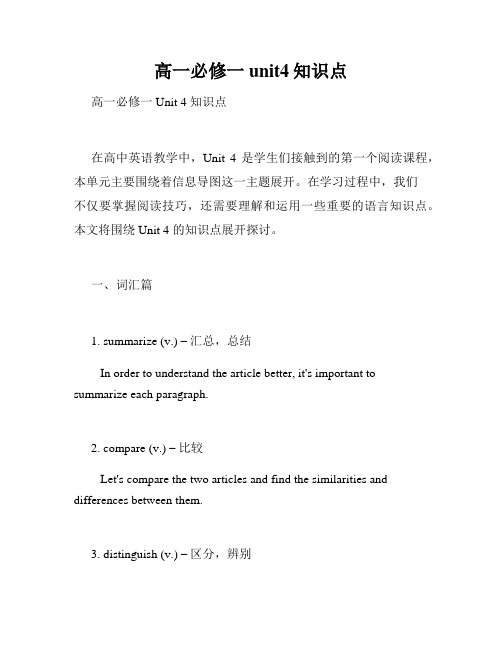
高一必修一unit4知识点高一必修一 Unit 4 知识点在高中英语教学中,Unit 4 是学生们接触到的第一个阅读课程,本单元主要围绕着信息导图这一主题展开。
在学习过程中,我们不仅要掌握阅读技巧,还需要理解和运用一些重要的语言知识点。
本文将围绕 Unit 4 的知识点展开探讨。
一、词汇篇1. summarize (v.) –汇总,总结In order to understand the article better, it's important to summarize each paragraph.2. compare (v.) –比较Let's compare the two articles and find the similarities and differences between them.3. distinguish (v.) –区分,辨别It is difficult to distinguish between twins because they look so similar.4. distinguish…from… –将…与…区分开来It is important to distinguish fact from fiction when reading news sources.5. classify (v.) –分类,归类The books in the library are classified according to genre and author.6. edit (v.) –编辑,剪辑The editor will edit your article before it is published.7. revise (v.) –修订,修改Before submitting the essay, make sure to revise and correct any grammatical errors.8. transfer (v.) –转移,转换The teacher encouraged the students to transfer their knowledge from the textbook to real-life situations.二、语法篇1. used to do sth. –过去常常做某事(现在不做了)I used to play basketball every Sunday, but now I prefer swimming.2. be used to –习惯于After living in the city for a year, I am used to the noise and fast pace of life.3. be/get accustomed to –习惯于She got accustomed to waking up early after a week of early morning meetings.4. be/get used to –习惯于After wearing glasses for a month, she finally got used to them.5. prefer…to… –更喜欢…而不是…I prefer watching movies to reading books because they are more visually stimulating.6. instead of –代替,而不是Instead of going out, I decided to stay at home and work on my homework.7. neither…nor…–既不…也不…Neither John nor Jane enjoys playing video games.8. both…and… –既…and…Both the teachers and the students participated in the school's charity event.三、阅读理解在阅读理解中,我们需要掌握一些常用的阅读技巧,如略读、精读、找关键词等。
高一英语人教版必修第一册期末复习重难点知识集锦Unit4(知识点)

高一英语人教版必修第一册期末复习重难点知识集锦Unit4(知识点)Unit 4 Natural Disasters Part one V ocabulary1. rescue n. & vt. 营救;救援come/go to sb.’s rescue 来/去救助某人rescue team/workers 救援队/人员rescue …from … 把……从……中解救出来2. damage vt. 损害;破坏n. 损坏;损失do/cause damage to… 对……造成损害/破坏3. affect vt.影响;(疾病)侵袭;深深打动affect = have an effect on 影响4. ruin n. & vt. 破坏;毁坏in ruins 严重受损;破败不堪go/come to ruin 灭亡;荒废5. shock n. 震惊;令人震惊的事;休克vt. (使)震惊in shock 震惊;吃惊in a state of shock 惊魂未定be shocked to do sth. 对做某事感到震惊6. trap vt. 使落入陷阱;使陷入圈套n. 险境;陷阱be trapped in 被困在……中,陷在……中trap sb. into doing sth. 陷害/诱骗某人做某人7. bury vt.埋葬;安葬bury oneself in = be buried in 埋头于;专心于8. breathe vi.& vt.呼吸breath n. 呼吸out of breathe 气喘吁吁地hold one’s breath 屏住呼吸9. supply n. 供应(量);补给;[pl.]补给品vt. 供应;供给supply sth. to sb. =supply sb. with sth.给某人提供某物10. survive vi. 生存;存活vt. 幸存;艰难度过survive on sth. = live on sth. 靠……存活11.calm adj. 镇静的;沉着的vt. 使平静;使镇静calm down 冷静下来keep calm 保持冷静12. aid n. 援助;帮助;救援物资vi. & vt. (formal) 帮助;援助first aid 急救with the aid of =with sb’s aid 在某人的帮助下13. sweep vt. & vi. (swept, swept) 打扫;清扫sweep away 消灭;彻底消除sweep over 突然袭来14. strike vi.& vt. (struck, struck/stricken)侵袭;突击;击打n. 罢工;罢课;袭击be on strike 在罢工it strike sb. that … 某人突然想到……15. deliver vt. &vi. 递送;传达vt. 发表be delivered of = give birth to 生产;分娩deliver a speech 发表演讲16. length n. 长;长度in length 在长度上at arm's length 在伸手可及处;保持一定距离地Part two Grammar定语从句定语从句(Attributive Clauses)在句中做定语,修饰一个名词或代词,被修饰的名词,词组或代词即先行词。
人教版高中英语必修一 Unit4 重难点知识归纳总结

人教版高中英语必修一Unit 4【重点单词】earthquake [ˈə:θkweik] n. 地震well [wel] n. 井crack [kræk]n. 裂缝;噼啪声vt. & vi. (使)开裂;破裂smelly [ˈsmeli:] adj. 发臭的;有臭味的farmyard [ˈfɑ:mˌjɑ:d] n. 农场;农家pipe [paɪp] n. 管;导管burst [bə:st] vi. (burst, burst) 爆裂;爆发n. 突然破裂;爆发million [ˈmiljən] n. 百万event [iˈvent] n. 事件;大事nation [ˈneiʃən] n. 民族;国家;国民canal [kəˈnæl] n. 运河;水道steam [sti:m] n. 蒸汽;水汽dirt [dɜːt] n. 污垢;泥土ruin [ˈruin] n. 废墟;毁灭vt. 毁灭;使破产suffering [ˈsʌfərɪŋ] n. 苦难;痛苦extreme [iksˈtri:m] adj. 极度的injure [ˈindʒə] vt. 损害;伤害survivor [səˈvaivə] n. 幸存者;生还者;残存物destroy [disˈtrɔi] vt. 破坏;毁坏;消灭brick [brik] n. 砖;砖块dam [dæm] n. 水坝;堰堤track [træk] n. 轨道;足迹;痕迹useless [ˈju:slis] adj. 无用的;无效的;无益的shock [ʃɔk] vt. & vi. (使)震惊;震动n. 休克;打击;震惊rescue [ˈreskju:] n. & vt. 援救;营救trap [træp] vt. 使陷入困境n. 陷阱;困境electricity [ilekˈtrisiti] n. 电;电流;电学disaster [diˈzɑ:stə] n. 灾难;灾祸bury ['berɪ] vt. 埋葬;掩埋;隐藏mine [maɪn] n. 矿;矿山;矿井miner ['maɪnə] n. 矿工shelter [ˈʃeltə] n. 掩蔽;掩蔽处;避身处title [ˈtaitl] n. 标题;头衔;资格reporter [riˈpɔ:tə] n. 记者bar [bɑː] n. 条;棒;条状物damage [ˈdæmidʒ] n. & vt. 损失;损害frighten [ˈfraitən] vt. 使惊吓;吓唬frightened ['fraɪtnd] adj. 受惊的;受恐吓的frightening ['fraɪt(ə)nɪŋ]adj. 令人恐惧的congratulation [kənˌɡrætjuˈleiʃən] n. 祝贺;(复数)贺词judge [dʒʌdʒ] n. 裁判员;法官vt. 断定;判断;判决sincerely [sɪnˈsɪəlɪ] adv. 真诚地;真挚地express [iksˈpres] vt. 表示;表达n. 快车;速递outline [ˈautlain] n. 要点;大纲;轮廓headline ['hedlaɪn] n. 报刊的大字标题cyclist [ˈsaɪklɪst] n. 骑自行车的人【重点短语】1.have time to do sth. 有时间做某事2.happen to do sth. 碰巧做某事3.shake hands with sb. 与某人握手4.burst into tears/ laughter=burst out crying/laughing 突然哭/笑起来5.in ruins 成为废墟6.blow away 吹走,刮走7.fall down 倒塌8.be pleased to do sth. 乐意做某事9.make/ give a speech 发表演说10.judging…from 根据……来判断11.dig out 挖掘12.a great/ large number of =a great/good many 大量的13.be trapped in/ under 陷入/陷在……下面14.have/make/let sb. do sth. 让某人做某事e to an end = put/ bring sth. to an end = put/ bring an end to sth. 结束某事16.be proud of / take pride in 因……而自豪17.invite sb. to do sth. 邀请某人做某事18.think little of 对……评价低19.think highly of 对……评价高20.give out 发出(气味等);分发;耗尽21.give away 赠送;泄露22.agree on ... 在……上达成共识【重点句型】1. The number of people who were killed or injured in the earthquake reached more than 400,000.(定语从句)地震中的死伤人数达到40多万。
- 1、下载文档前请自行甄别文档内容的完整性,平台不提供额外的编辑、内容补充、找答案等附加服务。
- 2、"仅部分预览"的文档,不可在线预览部分如存在完整性等问题,可反馈申请退款(可完整预览的文档不适用该条件!)。
- 3、如文档侵犯您的权益,请联系客服反馈,我们会尽快为您处理(人工客服工作时间:9:00-18:30)。
Unit four Earthquakes1、In the city, the water pipes in some buildings crached and burst.城市里,一些大楼里的水管爆裂。
burst爆裂,突发用法归纳:The square is bursting with tourists. 广场上到处都是游客。
I felt as if my heart would burst with joy. 我觉得自己高兴得心花怒放。
The police burst through the door. 警察破门而入。
There was a burst of laughter in the next room. 隔壁房间里突然爆发出一阵笑声。
联想扩展:(1) burst in on…突然打断He burst in on our conversation. 他突然打断了我们的谈话。
(2) burst into +n. 突然…The speaker burst into angry speech. 演讲者突然讲粗话。
(3) burst out + doing突然…The woman burst out crying like a child. 那个妇女突然像小孩一样哭了。
(4) burst to do sth. 迫切想做某事I am bursting to tell you the news. 我迫不及待的想告诉你这个消息。
2、But the one million people of the city, who thought little of these events, were asleep as usual that night.但是认为这没什么的一百万城里人,那天晚上还像往常一样睡觉。
易混辨析:affair, event, accident, incident, matter 和business 事;事情affair 指要做的事或已经发生的事。
多用复数。
event 指重大历史事件,也可指日常生活中较重要的事或比赛项目。
accident 指意外或偶然的不幸事件,多有不良后果。
incident 与重要事件有关的事情,尤指政治、军事上有争议的情况。
matter 需要认真考虑的事情。
business 日常事务、商业事务;还可以是公事。
3、The suffering of the people was extreme. 人们极度痛苦。
suffer用法归纳:A, 受苦He suffered terribly when his mother died.B, 受到损失If I lost, my self-esteem will suffer.C, 遭受 He suffered no pain联想扩展:suffer from1、受…之苦I suffered most from lack of rest.2、患…病I am suffering from a cold.特别提示:suffer表示“患…病”时,后面一般跟疾病名称。
即时活用:_______ such heavy pollution already , it may now be too late to clean up the river .A. Having sufferedB. SufferingC. To sufferD. Suffered答案:A4、Two-thirds of them died or were injured during the earthquake.地震中,有三分之二的人死亡或受伤。
易混辨析:injure ; hurt; wound; harm 伤害injure比hurt 正式,hurt多指伤痛,而injure则指损害健康、成就、容貌等,强调功能的损失。
hurt 既可指肉体上的伤害,也可指精神上、感情上的伤害。
指肉体上的伤害时,hurt 可与badly, slightly, seriously等连用;但若果指精神上的创伤,只能用very much, rather / deeply。
wound 指枪伤、刀伤、刺伤等皮肉之伤,是出血的、严重的伤,特指战场上受伤。
可以是肉体上的伤害,也可指精神上的创伤。
harm 表示引起对身体、物质或精神上的损害,常指伤害人的肉体,损坏东西以及损害健康、品质、事业等。
即时活用:1、Did you say that our neighbor ______ in the accident?A. badly hurtedB. was badly hurtedC. had badly hurtedD. was badly hurt答案:D2、My chest _____ when I take a deep breath, doctor.A. hurtsB. woundsC.harmsD. injure答案:A3、There was a fight in the street yesterday. Three people were seriously ____.A. hurtB. killedC. brokenD.cut答案:A4、The old lady died from the _____on her head; she was _______when cleaning windows on the ladder when she fell off it.A. injury; injuredB. wound; woundC. wounded; hurtD. hurt; injured答案:A5、The bus driver was badly ___on both legs in the traffic accident.A. woundedB. brokenC. injuredD. destroyed答案:C5、The number of people who were killed or injured reached more than 400,000.伤亡人数达到四十多万。
reach用法归纳:(1)到达The started early, hoping to reach there before dark. 它们很早就出发,希望天黑前到达那里。
易混辨析:reach; get; arrive 到达reach后直接加地点;get加to再加地点;arrive后加at/ in再加地点,at 后加小地点;in后加大地点。
如果表示地点的词是副词,get和arrive后都不能用介词。
另外,只表示“到了”,不强调到什么地方用arrive。
(2)达到The number of the students in our school will reach 2000 next year.我们学校学生的数量明年会达到2000。
(3)用手或脚够到Can you reach the book on the top of the shelf? 你能够到书架顶上的那本书吗?特别提示:reach还可以作名词,表示“用手或脚能够到的范围;管辖范围或臂展”。
Please pass me the salt, it’s out of my reach. 请把盐递给我,我够不到。
(4)传到某人手中/耳中Your letter reached me yesterday. 我昨天收到你的来信。
The news reached me just now. 我刚刚听到那个消息。
(5)通向;延伸Where does this road reach? 这条路通向哪里?即时活用:1、Most children stay at home until they ____ school age.A. geteC. reachD. arrive答案:C2、Dear Jenny, thank you for your letter which ______ on April 1st.A. arrivedB. arrived atC. arrivingD. arrived me答案:A3、It is _______that the letter will ____you this afternoon.A. most like; arriveB. likely; reachC. mostly like; getD. best like; reach答案:B6、Bricks covered the ground like red autumn leaves. 砖头象秋天的红树叶一样覆盖着地面。
cover用法归纳:(1)覆盖The playground is covered by fallen leaves, we should clean it. 操场被落叶覆盖,我们应该清扫。
特别提示:表示“覆盖”时,常用cover…with / by句型,并且译法比较灵活。
I am covered by dust. 我满身都是土。
She covered her face with her hands. 她用双手捂着脸。
(2)包括;包含;涉及The study of physics covers many subjects.(3) 保护;掩护The mother covered the baby from the falling ceiling. 母亲保护婴儿不受下落的天花板的伤害。
(4)走完多少路;看完多少页书。
I can cover 100 Li on foot a day. 我一天不行能走100里。
How many pages have you covered? 你看完了多少页书?(5)占多大面积Our school covers an area of 60.000 square meters. 我们学校占地60000平方米。
特别提示:表示“占多大面积”用…covers an area of +数词。
(6)采访The chief editor sent a reporter to cover the event. 主编派了一记者去采访整个事件。
易混辨析:cover和interviewcover表示“采访”时,表示对整个事件的采访;而interview多指对人的采访。
即时活用:1、The farm is huge, lying between the valleys, and ____ an area of 15 square kilometers.A. coveredB. being coveredC. coveringD. covers答案:D2、This is a long hard winter, with everything _______ white.A. coveredB. covered byC. coveringD. covering with答案:B3、This book is said to be a special one which ________ many events not found in other history books.A. writesB. coversC. printsD. reads答案:B4、This is a long hard winter, with everything _______ white.A. coveredB. covered byC. coveringD. covered with答案:D5、The farm is huge, lying between the valleys, and ____ an area of 15 square kilometers.A. coveredB. being coveredC. coveringD. covers答案:D7、The army organized teams to dig out those who were trapped and to bury the dead。
